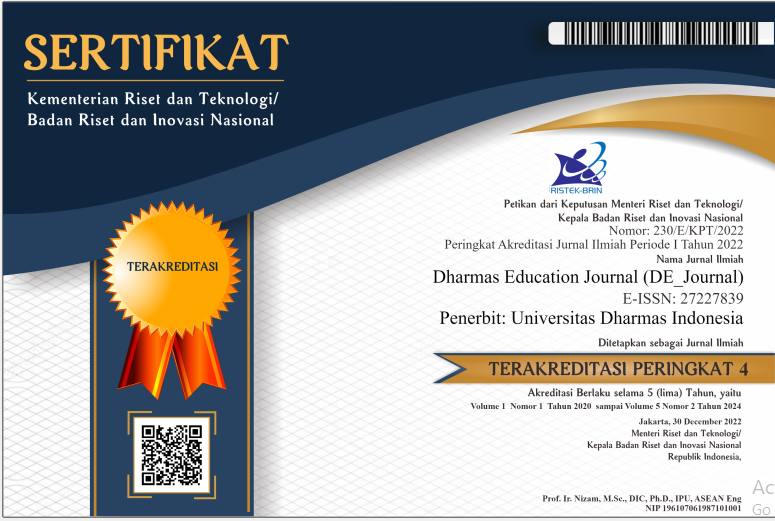THE ROLE OF ISLAMIC RELIGIOUS EDUCATION TEACHERS: PROBLEMS IN EVALUATING STUDENT LEARNING OUTCOMES IN JUNIOR HIGH SCHOOLS
DOI:
https://doi.org/10.56667/dejournal.v4i2.1060Keywords:
Peran Guru (PAI), Evaluasi, Hasil Belajar, ProblematikaAbstract
This research is related to issues in the evaluation of student learning outcomes that have not been explored in the aspects of Islamic religious education. The papers scrutinize the role of Islamic religious education teachers in the context of junior secondary schools and the impact of the problems faced by them on the evaluation of student learning outcomes. Through literature review and analysis of secondary data with a case study approach, this research presents a comprehensive picture of the challenges and important role of Islamic religious education teachers in improving students' understanding of Islam and the application of religious values in their daily lives. This study aims to determine the role of Islamic Education teachers in evaluating Islamic Religious Education learning outcomes at SMPN 11 Sungai Tuak Village Tanah Grogot. The study employed qualitative research. Research data were obtained from interviews with PAI teachers at SMPN 11 Sungai Tuak Village Tanah Grogot. Interviews were conducted to obtain information about the role of PAI teachers in evaluating student learning outcomes. The results showed that the type of evaluation applied by PAI teachers, media/tools used in evaluating, PAI activities in the school, methods in evaluating, problems in evaluating, and supporting factors, inhibiting factors and solutions to these problems.
Downloads
References
Adiyono, A. (2020). Pendekatan Pendidikan Islam Dalam Penerapan Manajemen. FIKRUNA, 2(1), 74-90.
Halimah, N., & Adiyono, A. (2022). Unsur-Unsur Penting Penilaian Objek Dalam Evaluasi Hasil Belajar. EDUCATIONAL JOURNAL: General and Specific Research, 2(1), 160-167.
Iman, B., Nuris, M., & Syaripuddin, R. (2023). Integrated Technology In Learning Viewed From The Lens 0f 21st Century Education: A Qualitative Study On Teacher’s Efforts In Improving Islamic Education Quality. Edukasi Islami: Jurnal Pendidikan Islam, 12(01).
Julaiha, J., Jumrah, S., & Adiyono, A. (2023). Pengelolaan Administrasi Madrasah Tsanawiyah Al-Ihsan dalam Meningkatkan Kualitas Pendidikan Madrasah. Journal on Education, 5(2), 3108-3113. https://doi.org/10.31004/joe.v5i2.970
Kabariah, S., & Adiyono, A. (2023). Efforts to Use Technology Effectively in Supporting the Implementation of Educational Supervision. Indonesian Journal of Education (INJOE), 3(1), 63-78.
Mardhatillah, A., Fitriani, E. N., Ma’rifah, S., & Adiyono, A. (2022). Pengembangan Kurikulum Pendidikan Agama Islam Dalam Meningkatkan Mutu Pembelajaran Di Sma Muhammadiyah Tanah Grogot. Jurnal Ilmu Pendidikan dan Kearifan Lokal, 2(1), 1-17.
Nashir, A., & Salenda, S. (2020). Kompetensi Guru Pendidikan Agama Islam Dalam Melaksanakan Evaluasi Hasil Belajar. PILAR, 11(1).
Rahayuningtias, Z. D. (2021). Penerapan Model Pengembangan Kurikulum PAI SMA Negeri 1 Batu Engau. SOKO GURU: Jurnal Ilmu Pendidikan, 1(2), 72-80.
Syaripuddin, R., & Ammade, S. (2023). Designing English Instructional Model: An Integrated Technology in ESP for Biological Students. Eduvelop: Journal of English Education and Development , 6(2), 103-113. https://doi.org/10.31605/eduvelop.v6i2.2291
Sawaluddin, S., & Muhammad, S. (2020). Langkah-langkah dan teknik evaluasi hasil belajar Pendidikan Agama Islam. Jurnal PTK Dan Pendidikan, 6(1).
Warsah, I., & Habibullah, H. (2022). Implementasi Evaluasi Hasil Belajar Pendidikan Agama Islam di Madrasah. JOEAI (Journal of Education and Instruction), 5(1), 213-225.
Wati, F., Kabariah, S., & Adiyono, A. (2022). Penerapan Model-Model Pengembangan Kurikulum Di Sekolah. Adiba: Journal Of Education, 2(4), 627-635.
Wati, W. C. (2022). Analisis Standar Hasil Evaluasi Melalui Proses Belajar. SOKO GURU: Jurnal Ilmu Pendidikan, 2(2), 170-176. https://doi.org/10.55606/sokoguru.v2i2.815
Downloads
Published
How to Cite
Issue
Section
License
Copyright (c) 2023 Dharmas Education Journal (DE_Journal)

This work is licensed under a Creative Commons Attribution-NonCommercial-NoDerivatives 4.0 International License.
Makalah yang disampaikan diasumsikan tidak mengandung bahan propietary yang tidak dilindungi oleh hak paten















